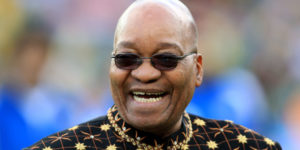A round-up of the powerful groups that have called for him to step down.
07/06/2017 06:33 SAST | Updated 07/06/2017 07:29 SAST
Amil Umraw


South African president Jacob Zuma
South African president Jacob Zuma.
ANALYSIS
Calls in the past three months for President Jacob Zuma’s head to roll have been far-reaching, to say the least. But being the political survivor that he is, the country seems no closer to a change of leadership.
Calls for Zuma to step down have come from within the ANC, its alliance members, religious organisations, civil society and the tens of thousands of people nationwide who marched against the president in April.
But the cries have fallen on deaf ears in the ANC and analysts say those who share an anti-Zuma sentiment may have to accept that he will remain president until 2019.
Here are some of the bigwigs who want Zuma gone:
The unions and the alliance
Nehawu was the first Cosatu-affiliated union to call for Zuma to step down, in November last year. The union said it was clear that the revolution was taking a “disastrous” trajectory as it “needlessly lurches” from crisis to crisis.
Numsa followed in December, calling Zuma a “criminal”.
Read: Crisis Within The Ranks: Tripartite Alliance Fights For Its Life
After Zuma’s most recent Cabinet reshuffle at the end of March, the SACP joined the rally, saying Zuma had plunged the nation into a “deep crisis”. Cosatu followed suit a week later, saying they no longer believe Zuma is the right person to unite and lead the movement, the alliance and the country.
Within the ANC
The calls for Zuma’s sacking from within the ANC came as early as April, when the Sefako Makgatho branch in Greater Johannesburg threatened that if the president did not step down, he would face a national disciplinary committee for bringing the party into disrepute.
Before the ANC national executive committee (NEC) meeting last week, party veterans and stalwarts wrote open letters to Zuma and the NEC asking the committee to “seriously consider” recalling the president. At the NEC meeting, longstanding members of the party tabled a motion of no confidence against Zuma.
Opposition parties
The Democratic Alliance, Economic Freedom Fighters, Congress of the People, United Democratic Movement and Inkatha Freedom Party are among some of the opposition parties who have called repeatedly for Zuma to step down.
Religious leaders
The South African Council of Churches last month established an Unburdening Panel, which sought to expose corruption in all levels of government. The group was vocal on the effects Zuma’s alleged relationship with the Gupta family has had on South Africa and called for him to step down. The National Religious Leaders Council also made the call.
Foundations
One of the biggest constituencies to call for Zuma’s removal was made up of foundations. Bearing the names of South African struggle icons and carrying influence in that respect, numerous foundations began coming forward in attempts to persuade the ANC to recall its president.
Some of these were the Nelson Mandela Foundation, the Ahmed Kathrada Foundation, the Oliver and Adelaide Tambo Foundation and the Jakes Gerwel Foundation.
Civil society
Civil society groups played a huge role in massing together protesters during demonstrations that took place countrywide in April. The organisations banded together under the banner Save SA. Black Sash and Business Leadership South Africa reiterated the calls for Zuma’s removal.
Although the calls for the president’s removal have come from far and wide, with dozens more calling for his sacking, analysts say he will remain president, at least until December this year.
The University of Western Cape’s Keith Gottschalk said Zuma’s survival was primarily organised during the ANC’s Polokwane conference in 2007 and his power remains in the NEC majority to now.
“But this majority is continuously on the defensive with all the scandals surrounding Zuma now. It seems like he will certainly be president until December, but after that, it is open,” Gottschalk said.
Gottschalk said Nkosazana Dlamini-Zuma has not yet grown significantly stronger than her presidential opponent, Cyril Ramaphosa, and Zuma will not want to step down until his ex-wife’s succession is guaranteed.
“If Ramaphosa is voted ANC president, the run-up to 2019 for Zuma as state president will be a different ball game entirely,” Gottschalk said.
Political analyst Ralph Mathekga said the problem with anti-Zuma activists is that they are trying to isolate Zuma from the ANC.
“There is still a picture that the ANC is a great party that makes no mistakes and this makes it difficult to evoke change. Zuma is hiding behind the ANC, but he has seized the party’s internal mechanisms. He has hijacked the ANC as a party. The best way to have him removed would be to understand that the ANC is a problem as well,” Mathekga said.
He added that Zuma will most probably remain as South Africa’s president until 2019.
“If he manages to get a successor from within his allies, he could step down or continue. It would not make a difference for him. It would be necessary for him to secure a successor from within his faction to avoid facing the consequences of the allegations that have been set forth against him,” Mathekga said.
http://www.huffingtonpost.co.za/2017/06/06/why-jacob-zuma-is-still-president_a_22129050/?utm_hp_ref=za-homepage

